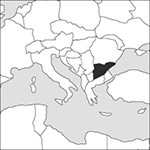
Capital:
Sofia
Area:
110,879 sq km (42,811 sq miles)
Population:
6,981,642 (2012 est)
Currency:
1 lev = 100 stotinki
Religions:
Eastern Orthodox 59.4%; Muslim 7.8%
Ethnic Groups:
Bulgarian 76.9%; Turkish 8.0%; Roma 4.4%
Languages:
Bulgarian (official); Turkish; Romany; Macedonian; minority languages
International Organizations:
UN; OSCE; NATO; Council of Europe; WTO; EU
A country of the Balkan Peninsula in south-east Europe. It is bordered by Romania to the north, Serbia and Macedonia to the west, Greece and Turkey to the south, and the Black Sea.
Physical
The northern boundary of Bulgaria is formed by the River Danube, except in the north-east; about 80 km (50 miles) to the south the long Planina range of Balkan Mountains runs parallel to the river, dividing the country laterally.
Economy
Until 1989 Bulgaria was a communist republic closely allied to the Soviet Union. An economic reform programme was introduced in 1991 with the support of the IMF; this involved the return of collectivized land to former owners and the privatization of small businesses. The removal of subsidies from food and other basic commodities caused considerable hardship and further reform stalled until 1994, when a mass privatization programme was launched. In 1996 the country was engulfed by an acute financial crisis when the national currency, the lev, collapsed. Following significant reforms, the mid-2000s saw fast economic growth. This ended with the global recession of 2009, and recovery has been slow. Bulgaria’s mineral resources include coal, iron ore, copper, lead, zinc, and petroleum from the Black Sea. Agricultural products include fruit and vegetables, tobacco, and wine, and important industries include electricity generation, gas production, and food processing. Tourism is a growing source of revenue.
History
Bulgaria was settled by central Asian tribesmen in the 5th century, colonized by the Romans, and then invaded by Slav Bulgars. They killed Emperor Nicephorus in 811 ad, and captured Adrianople in 813. Christianity was introduced in the 9th century. Greek and Magyar threats were repulsed but rebellion, and incursions by Greeks, Russians, and Serbs resulted in the kingdom being divided into three in the 11th century. It was annexed by the Ottoman empire in 1396 and ruled by the Turks for nearly five centuries.
In the 19th century Bulgarian nationalism led to a series of insurrections against the Ottoman Turks culminating in 1876, when several thousand Bulgars were massacred. Russia gave its support to Bulgaria, and war between Russia and Turkey followed. This was ended by the Treaty of San Stefano (March 1878) which created a practically independent Bulgaria covering three-fifths of the Balkan Peninsula. Britain, however, now feared that the new state would become a puppet of Russia. The Congress of Berlin (1878) therefore split the country into Bulgaria and Eastern Roumelia, which remained nominally under Turkish rule. In 1879 a democratic constituent assembly elected the German Prince, Alexander of Battenburg, as ruling prince and in 1885 Alexander incorporated Eastern Roumelia into Bulgaria. For this he was kidnapped by Russian officers and forced to abdicate. His successor was another German prince, Ferdinand of Saxe-Coburg (1887–1918). Taking advantage of the Young Turk movement Ferdinand formally proclaimed full independence from Turkish rule in 1908, and was crowned king. Participation in World War I on the side of Germany led to invasion by the Allies (1916), and the loss of territory through the Versailles peace settlement. Between 1919 and 1923 Bulgaria was virtually a peasant-dictatorship under Alexander Stamboliyski, the leader of the Agrarian Union. He was murdered and an attempt by communists under Dimitrov to seize power followed. Military and political instability persisted until 1935, when an authoritarian government was set up by Boris III (1918–43). World War II saw cooperation with Nazi Germany, followed by invasion by the Soviet Union. In 1946 the monarchy was abolished and a communist state proclaimed, Bulgaria becoming the most consistently pro-Soviet member of the Warsaw pact countries. In 1989 the communist leader Todor Zhivkov, who had been in office since 1954, was ousted from power. Free elections followed, with a new constitution in 1990. The introduction of privatization and other economic reforms has proved particularly painful in Bulgaria. After elections in 1994 a coalition government was formed (1995), led by the former Communist Party (renamed the Bulgarian Socialist Party, BSP). The BSP was defeated by the Union of Democratic Forces in elections in 1997. In 2001 the former king, Simeon II, became Prime Minister. He was replaced in 2005 by Sergei Stanishev, at the head of a BSP-led coalition. Bulgaria joined NATO in 2004 and the EU in 2007. Following the 2009 election the Citizens for European Development of Bulgaria, a new centre-right party, formed a minority government under Boyko Borisov. He resigned in 2013 in response to popular protests. After the subsequent election a BSP-led coalition was formed, with the independent Plamen Oresharski as Prime Minister, but it only lasted a year and Borisov returned to power in a 2014 election. In addition to a sluggish economy and stalled reforms that have limited the inflow of EU funds, in 2015 Bulgaria became a transit route for migrants from Syria and elsewhere wishing to reach northern Europe. It constructed a razor-wire fence along its border with Turkey, and there were reports of the mistreatment of migrants and much political anti-Muslim rhetoric.
- documentation map
- document image processing
- Document Object Model
- document processing
- document reader
- document scanner
- document sorter
- document type definition
- DOD
- dodder
- dodecagon
- dodecahedron
- dodecanoic acid
- dodecene
- dodecylbenzene
- Dodgson, Charles Lutwidge (1832–98)
- DO event
- dog
- doge
- dogfish
- Dogger
- dogma
- Dog Star
- dog-tooth spar
- dogwood